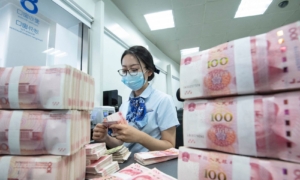
In recent years, several mainland Chinese banks have presented “withdrawal difficulties” and “unexpected account freezes,” causing concerns among the public. A recent investigation revealed that many Shenzhen bank branches are experiencing an influx of Hong Kong residents lining up to withdraw money. Banks have raised the difficulty level for cash withdrawals to discourage large withdrawals. An economist’s analysis suggests that the problem may not be limited to individual banks but could be related to the banking system’s bad debts.
Difficult for Hong Kong Residents to Withdraw Cash
A Radio Free Asia investigation found that the Shenzhen branches of the Bank of China, Construction Bank, and Industrial and Commercial Bank have long queues due to the arduous process of cash withdrawal. Some Hongkongers who tried to withdraw 60,000 RMB had to queue for hours before entering the bank and then wait again for 1 to 2 hours for a teller to process their transactions. Both the regular and VIP counters had only one bank staff member processing cash transactions, causing delays. Even after reaching the counter, tellers repeatedly asked for the reason for the withdrawals, checked multiple documents, required multiple signatures, and entered passwords multiple times. The entire process took about five hours.
The wait time is even longer for large cash withdrawals in mainland Chinese banks. According to Radio Free Asia’s investigation, the Bank of China now requires a minimum of one-day advance notice for withdrawals above 200,000 RMB (US$27,839). Different branches have varying requirements, with some even raising the withdrawal threshold, requiring personal appointments for withdrawals above 20,000 RMB (US$2,783) to be made on specific days.
Additionally, only some banks provide large cash withdrawal services, with some banks having a withdrawal limit of only 100,000 RMB (US$1,391) per transaction. Although phone reservations are offered, most lines are constantly busy. Even using ATMs to withdraw cash can take at least an hour, as approval from security personnel is required before entering the bank.
According to China’s customs regulations, individuals can carry up to 20,000 RMB (US$2,783) cash when crossing the border. Remittances are also subject to the same limit. To retrieve their savings from mainland Chinese banks, many Hong Kongers have to send their retired elderly relatives to China daily to withdraw 20,000 RMB (US$2,783) each time, a process that takes at least an hour of queuing and is time-consuming.
Hong Kong Bank Accounts Frozen Under Pretext of Investigation
While it is already difficult for Hong Kong residents to withdraw money from mainland Chinese banks, the situation becomes even more absurd when remittances and bill payments are treated as suspicious funds, resulting in sudden account freezes. Some reported that sending 5,000 RMB (US$695) to his mother living in Dongguan for daily expenses resulted in his account being frozen under the pretext of “money laundering/fraud investigation.” Even monthly automated transfers for mortgage payments, management fees, utilities, and the like, are labeled as “black money,” requiring time-consuming visits to multiple branches to file complaints to unfreeze the accounts.
Another individual, Mr. Sun, rarely used paper money in Shenzhen, relying mainly on electronic currencies. However, from November 2021 to February 2022, his bank account was frequently frozen. Mr. Sun said he “received letters stating that his account was investigated by police in different provinces and counties for various allegations of ‘ money laundering or fraud.’
Mr. Sun also showed The Epoch Times the contacts and conversations of the CID teams of more than a dozen police stations in various provinces and counties in China, who at the time were claiming that he was related to the “investigation.” He had to call them one by one for further clarification to prove that he had nothing to do with the crime.
Economist: The Bank System May Be Facing a Liquidity Problem
Economist Law Ka-chung pointed out in a YouTube program that similar problems are occurring in several mainland Chinese banks, suggesting that it may not be isolated to individual banks but could be a broader problem within the banking system. He questioned “whether the entire system faced a liquidity problem or bad debts,” saying, “It’s unclear if the entire system is short of money and has liquidity issues, but the signs are quite apparent.”
Law also expressed concerns that the slow pace of cash withdrawals in Shenzhen could indicate significant bad debts in banks, affecting asset quality. He added that this could be related to the property or bond markets in China, which have raised concerns in the financial market. If a similar scenario is found in several provinces and cities in China, it may reflect problems within the entire banking system.
Regarding the possibility of such issues affecting Hong Kong, Law suggested that “if banks impose appointment requirements and delays for withdrawals, it could indicate underlying problems. If one day, when you want to withdraw money, the bank gives you excuses, requires you to make appointments, and follows certain procedures, you need to pay attention to the possibility of problems with fund transfers. If that happens, the situation might be dire.”
Law also raised concerns about China’s banks slowing down cash withdrawals for Hong Kong residents, which might indicate a significant number of bad debts, impacting the overall economic situation. “It might be related to China’s property or debt market, which the market knows is not in good shape. China’s unemployment rate and GDP are not matching up, and if there are issues within the banking system, it’s a warning sign that the situation could rapidly deteriorate.”
